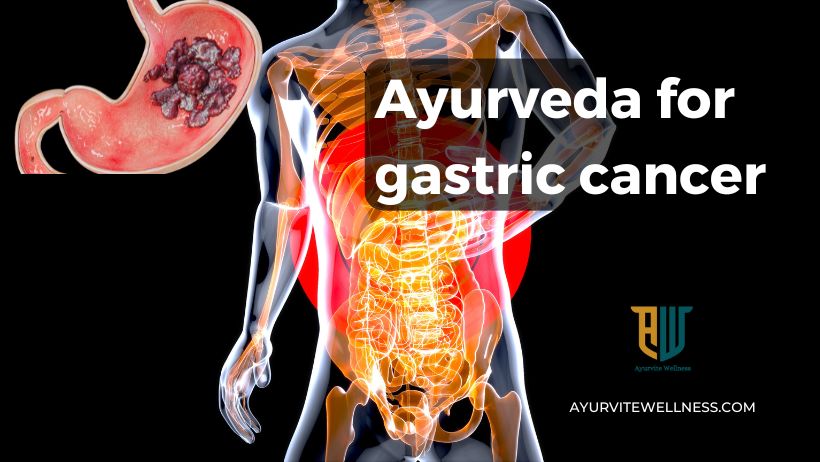Gastric cancer, also known as stomach cancer, is a significant global health concern, affecting millions of people worldwide. While modern allopathic medicine offers essential treatment options such as surgery, chemotherapy, and radiation therapy, Ayurveda, the ancient Indian medical system, provides a unique and holistic approach to managing this condition. This article explores the Ayurvedic perspective on gastric cancer, highlighting its potential for comprehensive patient care and improved quality of life.
Ayurvedic Understanding of Gastric Cancer
In Ayurveda, health and disease are viewed through the lens of the body’s balance of three primary doshas: Vata, Pitta, and Kapha. Gastric cancer is understood as a manifestation of Ama (toxic waste) accumulation and the vitiation of the Pitta Dosha (fire element) within the gastrointestinal tract. This imbalance disrupts digestion and cellular health, leading to the formation of Granthi (tumors).
The Role of Ama and Pitta Dosha
Ama is the undigested and unabsorbed food or metabolic waste that accumulates in the body due to improper digestion. When Ama builds up in the gastrointestinal tract, it can interfere with normal cellular functions, creating a breeding ground for abnormal growths, including cancerous tumors. The Pitta Dosha, responsible for digestion and metabolism, when imbalanced, can exacerbate this condition by increasing inflammation and acidity, further promoting the development of gastric cancer.
The Ayurvedic Approach
A core principle of Ayurveda in treating diseases like gastric cancer is Shodhana (purification). This involves cleansing the body to eliminate toxins and restore balance among the doshas.
Shodhana: The Purification Process
Shodhana techniques, such as Panchakarma, are integral to Ayurvedic treatment. Panchakarma is a five-fold detoxification therapy that includes Vamana (emesis), Virechana (purgation), Basti (enema), Nasya (nasal administration), and Raktamokshana (bloodletting). These procedures aim to expel Ama and rebalance the doshas, creating a more favorable internal environment for healing and recovery.
Dietary and Lifestyle Modifications
Diet and lifestyle play crucial roles in Ayurvedic treatment. A Satvic diet, consisting of pure and easily digestible foods, is recommended to promote healthy digestion and reduce the burden of Ama on the body. Foods that are spicy, sour, and fermented, which can aggravate the Pitta Dosha, are generally discouraged.
Satvic Diet Guidelines
- Fresh Fruits and Vegetables: Preferably cooked to aid digestion.
- Whole Grains: Such as rice, quinoa, and oats.
- Legumes: Including lentils and mung beans.
- Dairy Products: Like milk and ghee (clarified butter), which are soothing to the digestive tract.
- Herbal Teas: Such as ginger and turmeric tea to aid digestion and reduce inflammation.
Stress Management Practices
Stress management is another critical component of the Ayurvedic approach to gastric cancer. Techniques such as Yoga and Pranayama (breathing exercises) are employed to calm the mind and support the body’s natural healing mechanisms. Regular practice of these techniques can help reduce stress-related digestive issues and improve overall well-being.
Herbal Remedies
Ayurveda boasts a rich arsenal of herbs with potential benefits for gastric cancer patients. These herbs are known for their anti-inflammatory, antioxidant, and detoxifying properties.
Key Ayurvedic Herbs
- Turmeric (Curcumin): Known for its potent anti-inflammatory and anticancer properties. Curcumin can inhibit the growth of cancer cells and reduce inflammation in the gastrointestinal tract.
- Giloy (Tinospora cordifolia): An immune booster and detoxifier that supports overall health and resilience.
- Manjistha (Rubia cordifolia): Helps in detoxification and blood purification, supporting the body’s natural healing processes.
- Punarnava (Boerhaavia diffusa): Known for its diuretic and rejuvenating properties, it aids in detoxification and maintaining cellular health.
ARBUGUARD CAPSULES by Ayurvite Wellness for Cancer Prevention
Integration with Modern Medicine
One of the significant advantages of Ayurveda is its ability to integrate seamlessly with modern medical treatments. Ayurvedic interventions can complement conventional treatments like surgery, chemotherapy, and radiation therapy, providing a holistic approach to patient care.
Managing Treatment Side Effects
Ayurvedic herbs and therapies can help manage the side effects of conventional cancer treatments, such as nausea, vomiting, and fatigue. For instance, ginger and peppermint can alleviate nausea, while Ashwagandha (Withania somnifera) can reduce fatigue and improve energy levels. This integrative approach enhances the patient’s quality of life and supports their overall treatment plan.
Case Study: Integrative Approach in Gastric Cancer Management
Consider a hypothetical case of a 55-year-old patient diagnosed with gastric cancer. The patient undergoes conventional treatments, including surgery and chemotherapy. Alongside, the patient incorporates Ayurvedic practices:
- Dietary Adjustments: Shifts to a Satvic diet, avoiding spicy and acidic foods.
- Herbal Support: Takes turmeric and giloy supplements to boost immunity and reduce inflammation.
- Stress Management: Practices yoga and meditation daily to manage stress and improve mental well-being.
- Detoxification: Undergoes a tailored Panchakarma therapy to eliminate Ama and rebalance doshas.
Over time, the patient experiences reduced treatment side effects, improved digestion, and enhanced overall well-being, illustrating the potential benefits of an integrative approach.
Conclusion
Ayurveda, with its emphasis on holistic well-being, offers a valuable adjunct to the conventional management of gastric cancer. By addressing the root causes of imbalance and promoting overall health, Ayurveda can empower patients on their journey towards healing. The integration of Ayurvedic principles with modern medical treatments provides a comprehensive approach to managing gastric cancer, enhancing patient care, and improving quality of life.
As we continue to explore and validate the benefits of Ayurveda through evidence-based research, its role in the 21st-century healthcare landscape will only grow stronger. Embracing this ancient wisdom alongside modern advancements offers a beacon of hope and healing for gastric cancer patients worldwide.



